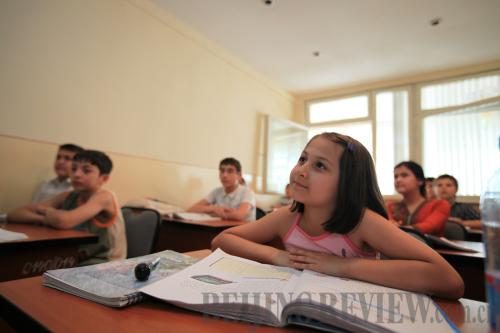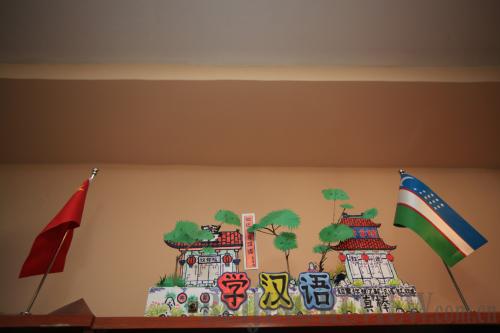|
 |
|
WITH CONCENTRATION: Uzbek students attend a Chinese class in the Confucius Institute in Tashkent (YANG JIA) |
Situated in the downtown area of the capital city, the institute occupies a ground area of 370 square meters, and boasts state-of-the-art equipment and facilities including audio-visual classrooms, a library and a multifunctional center.
"With a strong teaching staff, the institute not only provides audio-video, cable TV and Web search services for Chinese language learners, but also holds language contests and teaching seminars regularly," said Wang Fang, the Chinese president of the institute.
During the past five years, with the support of the Confucius Institute Headquarters in Beijing, Lanzhou University of China and Tashkent State Institute of Oriental Studies, the Tashkent Confucius Institute has scored several outstanding accomplishments. Since 2007, the institute has been ranked by the headquarters twice among the top 20 Confucius Institutes in the world, and both its Uzbek and Chinese presidents have won honorary titles as model workers.
In line with the rising demand for Chinese language learning among the local people, the enrollment of students has increased drastically since 2006. So far the institute has set up 11 classes at elementary and intermediate levels with enrollment of more than 500, and given lessons of 600 class hours in total.
Among the students, the youngest is only 8 years old, while the oldest is 63. Ajubhon, 10, and his sister Nozanin, 14, were among the students in an elementary level class. Now, Ajubhon can sing a song in Chinese.
Li Jia, a volunteer teacher from China, said many parents were willing to send their children to the institute. "Right now learning Chinese is in vogue here."
Cultural ambassador
 |
|
A corner of the Confucius Institue in Tashkent, Uzbekistan (YANG JIA) |
In Kazakhstan, there are two Confucius Institutes: one in Astana, the capital city; the other in Almaty, the country's largest city. Accompanied by Kazakh President Nursultan Nazarbayev, President Hu Jintao made a special trip to the Confucius Institute in Astana during his 2009 visit, and encouraged both sides to strengthen cooperation in Chinese teaching.
In partnership with China's Lanzhou University, the Almaty-based Al-Farabi Kazakh National University set up a Chinese language center in 1999, which developed three years later into what is today's Confucius Institute. The institute now offers training programs to students in the translation in specialist fields such as foreign trade, oil and gas, mining and metallurgy.
The Kazakh president of the institute Asylbekov Rahymjan said the task of the institute was to provide Kazakh people who are interested in China with abundant university-based exchange programs, academic lectures, and cultural exchange activities. "By improving the quality of Chinese language teaching, we hope to build up a talent bank of students who are proficient in Chinese," he said. So far approximately 3,000 students have completed studies in the institute, and many have been employed by local Chinese enterprises, such as the Industrial and Commercial Bank of China in Almaty. The current first secretary of the Chinese Consulate General in Almaty is a graduate from the institute.
|
